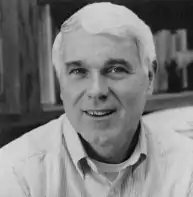Garland E. Allen
Garland Edward Allen III (born February 13, 1936)[1] is an American historian and biographer at Washington University in St. Louis. His research interests lie primarily in the history of genetics, eugenics and evolution.
Garland E. Allen | |
|---|---|
 | |
| Born | Garland Edward Allen III February 13, 1936 |
| Nationality | American |
| Education | University of Louisville Harvard University |
| Known for | Writings on the life of Thomas Hunt Morgan Work on the history of eugenics |
| Awards | 2017 George Sarton Medal from the History of Science Society |
| Scientific career | |
| Fields | History of science Philosophy of science |
| Institutions | Washington University in St. Louis |
| Thesis | Thomas Hunt Morgan: The Relation of Genetic and Evolution Theory, 1900-1925 (1966) |
| Doctoral advisors | Ernst Mayr Everett Mendelsohn |
Life
Allen was born on February 13, 1936, in Louisville, Kentucky.[2] He graduated from the University of Louisville in 1957. He completed his PhD in the history of science at Harvard University in 1966 under the direction of Ernst Mayr and Everett Mendelsohn after spending a few years as a high school biology teacher.[3] He has taught at Washington University and has held several visiting professorships at Harvard.
Thomas Hunt Morgan
To date, Allen has offered the fullest treatment of the life and work of Thomas Hunt Morgan, himself a Kentucky native. Allen's extensive review of Morgan presents the story of an experimentalist who staunchly avoided open political ties to science for fear of biasing the research. His discussion of the fly room, first at Columbia, then at Caltech, suggests that the collaborative environment within which Morgan worked with his students, H.J. Muller, Alfred Sturtevant, Calvin Bridges, and Theodosius Dobzhansky played an important role in establishing Drosophila melanogaster as a model organism for genetics, and launching the careers of these titans of 20th century genetics.[4] Allen's work contributes to the body of history chronicling the emergence of American science.
Eugenics
Allen is an international leader on the history of eugenics.[5] His work suggests that eugenics movements were not merely localized to Germany, Britain and America, but rather that eugenics constituted an international ideological shift from social Darwinism, whereby nature would weed out people with poor heredity, to an ideology where humanity must control its own genetic stock.[6] He has suggested that with the unveiling of the human genome, we should be cautious of a new wave of the eugenics movement.[7]
Works
- Matter, Energy, and Life (4 Editions)
- Life Sciences in the 20th Century (1975)
- Thomas Hunt Morgan: The Man and his Science (1978)
- Biology: Scientific Process and Social Issues (2002)
Accolades
- 2011: Fellow of American Association for the Advancement of Science [8]
- Trustee and Chairman of the history committee at the Marine Biological Laboratory
- President of the International Society for the History, Philosophy and Social Studies of Biology
- 2017: George Sarton Medal AAAS
References
- American Men & Women of Science. Thomson/Gale. 2009. p. 92. ISBN 9781414433011.
- "Who's Who Missouri" (PDF). University of Missouri Standing Committees. Archived from the original (PDF) on 2015-04-05. Retrieved 2018-09-18.
- MacLeod, Roy M. (2002). Science, history, and social activism: a tribute to Everett Mendelsohn. Springer. p. 416. ISBN 9048159687.
- Coleman, William (Dec 1979). "Reviewed Work: Thomas Hunt Morgan: The Man and His Science by Garland E. Allen". The American Historical Review. 84 (5): 1494. doi:10.2307/1861696. JSTOR 1861696.
- Fitzpatrick, Tony (May 4, 2004). "Social problems such as obesity can't be solved through genetics alone, warns biologist". Washington University in St. Louis. Retrieved February 3, 2017.
- Allen, Garland (2002). "Eugenics as an International Movement". International Encyclopedia of the Social & Behavioral Sciences: 4882–4889. doi:10.1016/B0-08-043076-7/03396-9. ISBN 9780080430768.
- Allen, Garland (October 2001). "Is a New Eugenics Afoot?". Science. 294 (5540): 59–71. doi:10.1126/science.1066325. PMID 11588239.
- "Archived copy". Archived from the original on 2012-07-02. Retrieved 2012-04-04.CS1 maint: archived copy as title (link)